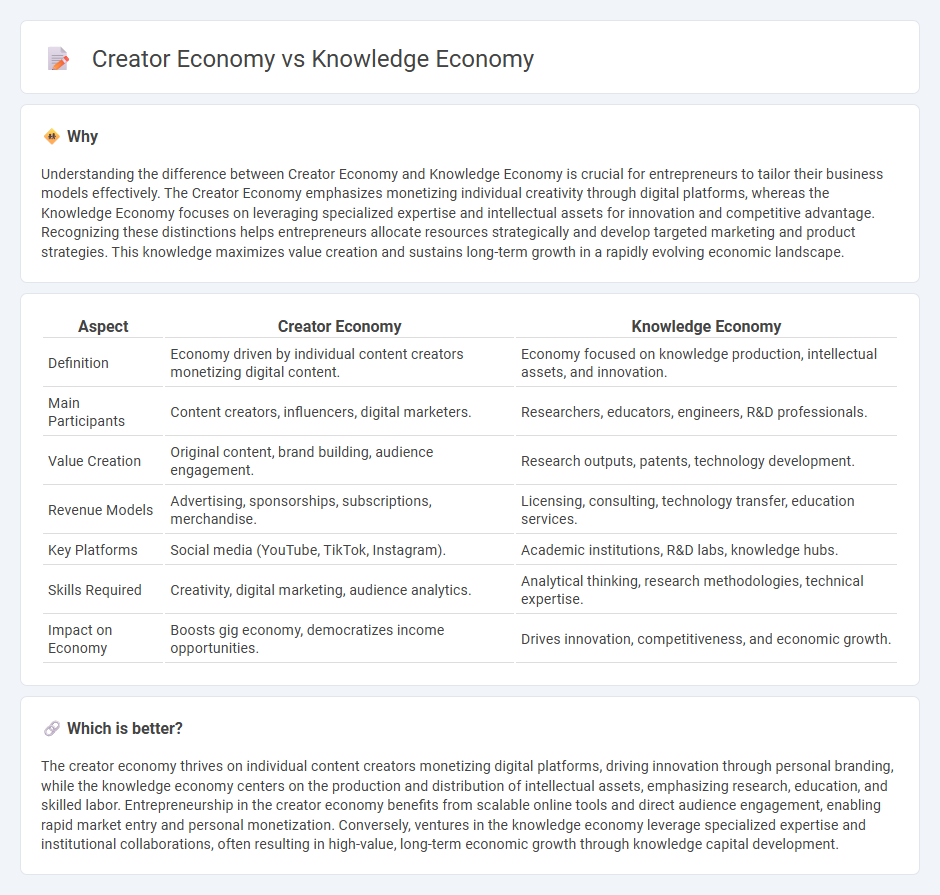
Entrepreneurship thrives at the intersection of the creator economy, driven by digital content and individual innovation, and the knowledge economy, centered on expertise, information exchange, and intellectual assets. Emerging trends highlight how startups leverage user-generated content platforms alongside data-driven insights to disrupt traditional markets. Explore the dynamic relationship between these economies to unlock new opportunities for entrepreneurial success.
Why it is important
Understanding the difference between Creator Economy and Knowledge Economy is crucial for entrepreneurs to tailor their business models effectively. The Creator Economy emphasizes monetizing individual creativity through digital platforms, whereas the Knowledge Economy focuses on leveraging specialized expertise and intellectual assets for innovation and competitive advantage. Recognizing these distinctions helps entrepreneurs allocate resources strategically and develop targeted marketing and product strategies. This knowledge maximizes value creation and sustains long-term growth in a rapidly evolving economic landscape.
Comparison Table
| Aspect | Creator Economy | Knowledge Economy |
|---|---|---|
| Definition | Economy driven by individual content creators monetizing digital content. | Economy focused on knowledge production, intellectual assets, and innovation. |
| Main Participants | Content creators, influencers, digital marketers. | Researchers, educators, engineers, R&D professionals. |
| Value Creation | Original content, brand building, audience engagement. | Research outputs, patents, technology development. |
| Revenue Models | Advertising, sponsorships, subscriptions, merchandise. | Licensing, consulting, technology transfer, education services. |
| Key Platforms | Social media (YouTube, TikTok, Instagram). | Academic institutions, R&D labs, knowledge hubs. |
| Skills Required | Creativity, digital marketing, audience analytics. | Analytical thinking, research methodologies, technical expertise. |
| Impact on Economy | Boosts gig economy, democratizes income opportunities. | Drives innovation, competitiveness, and economic growth. |
Which is better?
The creator economy thrives on individual content creators monetizing digital platforms, driving innovation through personal branding, while the knowledge economy centers on the production and distribution of intellectual assets, emphasizing research, education, and skilled labor. Entrepreneurship in the creator economy benefits from scalable online tools and direct audience engagement, enabling rapid market entry and personal monetization. Conversely, ventures in the knowledge economy leverage specialized expertise and institutional collaborations, often resulting in high-value, long-term economic growth through knowledge capital development.
Connection
The creator economy thrives on digital platforms enabling individuals to monetize content, while the knowledge economy is driven by intellectual capital and innovation. Both economies rely heavily on specialized skills, digital technology, and access to information to generate value and foster entrepreneurial ventures. This synergy accelerates new business models focused on content creation, knowledge sharing, and monetization through online communities and digital marketplaces.
Key Terms
Intellectual Capital
The knowledge economy emphasizes the generation, management, and utilization of intellectual capital, including expertise, patents, and organizational knowledge that drive innovation and economic growth. In contrast, the creator economy centers around individual content creators leveraging personal brands, digital platforms, and creative assets to generate income and influence. Explore how intellectual capital transforms these economies and shapes future innovation models.
Digital Platforms
Digital platforms are central to both knowledge economy and creator economy, serving as hubs for information exchange and content creation. The knowledge economy emphasizes intellectual capital and innovation, while the creator economy centers on individual content producers monetizing digital interactions. Explore how leading platforms like YouTube, TikTok, and LinkedIn drive these economies and shape the future of work.
Monetization
The knowledge economy drives value through expertise, intellectual property, and information exchange, emphasizing scalable monetization via licensing, consulting, and education products. The creator economy centers on individual content creators leveraging platforms like YouTube, TikTok, and Patreon to monetize audience engagement directly through subscriptions, sponsorships, and digital goods. Explore how distinct monetization models shape emerging economic landscapes and opportunities.
Source and External Links
Knowledge Economy, The KAM Methodology And World Bank - The knowledge economy is an economic system where knowledge is the main engine of growth, relying on the creation, dissemination, and effective use of knowledge supported by four pillars: economic incentives and institutions, educated and skilled workers, innovation capability, and modern information infrastructure.
Knowledge economy - Wikipedia - A knowledge economy is based on knowledge-intensive activities with a highly skilled workforce, emphasizing intellectual capital over physical labor, and promotes innovation, technical skills, and adaptability, contrasting with agrarian or industrial economies.
Knowledge Economy: Overview & Characteristics - The knowledge economy relies heavily on intellectual capabilities rather than physical inputs, driving growth through proprietary technology, big data, automation, and innovation collaboration among research centers and universities, leading to productivity gains when combined with organizational changes.
 dowidth.com
dowidth.com